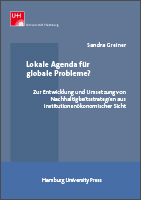Lokale Agenda für globale Probleme? Zur Entwicklung und Umsetzung von Nachhaltigkeitsstrategien aus institutionenökonomischer Sicht
Author(s)
Greiner, Sandra
Collection
AG UniversitätsverlageLanguage
GermanAbstract
Many of the environmental and development policy problems discussed today have a global impact on people's well-being, while at the same time avoiding national control. Economic analyses describe the low incentives of each nation-state to contribute to the protection of global public goods and recommend cooperation at international level, where the rules for sustainable development need to be defined. International conferences such as the World Summit on Sustainable Development in Johannesburg in 2002 reflect this need, but are lagging behind many in terms of concrete measures. In view of the increasing globality and networking of the problems, the opposing initiative of Local Agenda 21, which suggests a solution in the local area, is surprising. The initiative, which was founded in 1992 and has since then been continued in communities all over the world, is a revolution of small steps that can meaningfully complement and support the effective global proclamations. At the local level, interests can be consolidated, innovative practices tested and snowball effects can be exploited for their dissemination and, in the long term, people's interest and awareness of sustainable development can be awakened. The book examines how local communities can play their role as a second important pillar in the implementation of sustainable development.
Keywords
Germany; Local Agenda 21; sustainability; institutions; economic development; economic resources; environmental protection; spatial planning; countryDOI
10.15460/HUP.5ISBN
9783980822336OCN
1082958809Publisher
Hamburg University PressPublication date and place
Hamburg, 2002Classification
The environment


 Download
Download Web Shop
Web Shop